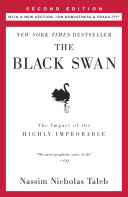

Nassim Nicholas Taleb introduces the concept of a 'Black Swan' as an event that is highly improbable, has a massive impact, and is often rationalized in hindsight. These events are characterized by their extreme rarity and unpredictability. Taleb argues that traditional statistical methods and models fail to account for these outliers, leading to a false sense of security and understanding. The idea is that we often only focus on what we know and can measure, neglecting the vast unknowns that can drastically change our lives. Taleb uses historical examples, such as the rise of the internet or the 9/11 attacks, to illustrate how Black Swans shape our world. He emphasizes that recognizing the potential for these unpredictable events is crucial for navigating life and making decisions.
Continue readingOne of the central themes of 'The Black Swan' is the limitation of human predictability. Taleb critiques the reliance on models and forecasts that attempt to predict future events based on past data. He argues that many of these models, particularly in finance and economics, are built on assumptions that do not hold true in the face of unexpected events. Taleb discusses the importance of acknowledging uncertainty and the inherent unpredictability of complex systems. By understanding that many significant events cannot be predicted, individuals and organizations can better prepare for the unexpected, rather than relying on flawed predictive models.
Continue readingTaleb delves into the human tendency to create narratives that explain events after they have occurred, a phenomenon known as hindsight bias. This bias leads people to believe that they could have predicted the outcome of an event, even when it was entirely unpredictable. Taleb warns that this tendency can result in overconfidence, as individuals and organizations may become complacent, thinking they can foresee future events based on past occurrences. He emphasizes the importance of recognizing the limitations of our understanding and the narratives we construct, advocating for a more skeptical and humble approach to knowledge.
Continue readingTaleb discusses how Black Swan events have a disproportionate impact on society, often leading to significant changes in various domains, including politics, economics, and technology. He argues that while these events are rare, their consequences can be transformative and far-reaching. For example, the financial crisis of 2008 can be viewed as a Black Swan that reshaped global economies and financial systems. Taleb encourages readers to consider the implications of these events and to understand that history is often shaped by the unexpected, rather than the predictable.
Continue readingIn 'The Black Swan,' Taleb introduces the concept of antifragility, which refers to systems that benefit from shock, volatility, and uncertainty. Unlike fragile systems that break under stress, antifragile systems thrive and grow stronger in the face of challenges. Taleb argues that individuals, organizations, and societies should strive to become antifragile by embracing uncertainty and preparing for the unexpected. This mindset encourages adaptability and resilience, allowing people to navigate the complexities of life more effectively. Taleb provides practical strategies for cultivating antifragility, such as decentralization, redundancy, and risk management.
Continue readingTaleb emphasizes the concept of 'skin in the game,' which refers to the idea that individuals should bear the consequences of their decisions and actions. He argues that many experts and decision-makers operate without accountability, leading to poor outcomes for society at large. By having skin in the game, individuals are incentivized to make better choices and consider the broader impact of their actions. Taleb believes that this principle is essential for fostering responsibility and ethical behavior in various fields, including finance, politics, and business. He encourages readers to seek out situations where they have a personal stake in the outcomes, as this can lead to more thoughtful and responsible decision-making.
Continue readingThe final key idea in 'The Black Swan' is the importance of embracing uncertainty and complexity in our lives. Taleb argues that the world is inherently complex, and attempts to simplify it through rigid models and predictions often lead to failure. He encourages readers to accept the unpredictable nature of life and to cultivate a mindset that is open to new ideas and experiences. By embracing uncertainty, individuals can better navigate challenges and seize opportunities that arise from unforeseen circumstances. Taleb's call to action is to move away from the illusion of control and to recognize the value of adaptability and flexibility in an ever-changing world.
Continue readingThe reading time for The Black Swan depends on the reader's pace. However, this concise book summary covers the 7 key ideas from The Black Swan, allowing you to quickly understand the main concepts, insights, and practical applications in around 22 min.
The Black Swan is definitely worth reading. The book covers essential topics including The Concept of Black Swans, The Limitations of Predictability, The Role of Narrative and Hindsight Bias, providing practical insights and actionable advice. Whether you read the full book or our concise summary, The Black Swan delivers valuable knowledge that can help you improve your understanding and apply these concepts in your personal or professional life.
The Black Swan was written by Nassim Nicholas Taleb.
If you enjoyed The Black Swan by Nassim Nicholas Taleb and want to explore similar topics or deepen your understanding, we highly recommend these related book summaries:
These books cover related themes, complementary concepts, and will help you build upon the knowledge gained from The Black Swan. Each of these summaries provides concise insights that can further enhance your understanding and practical application of the ideas presented in The Black Swan.